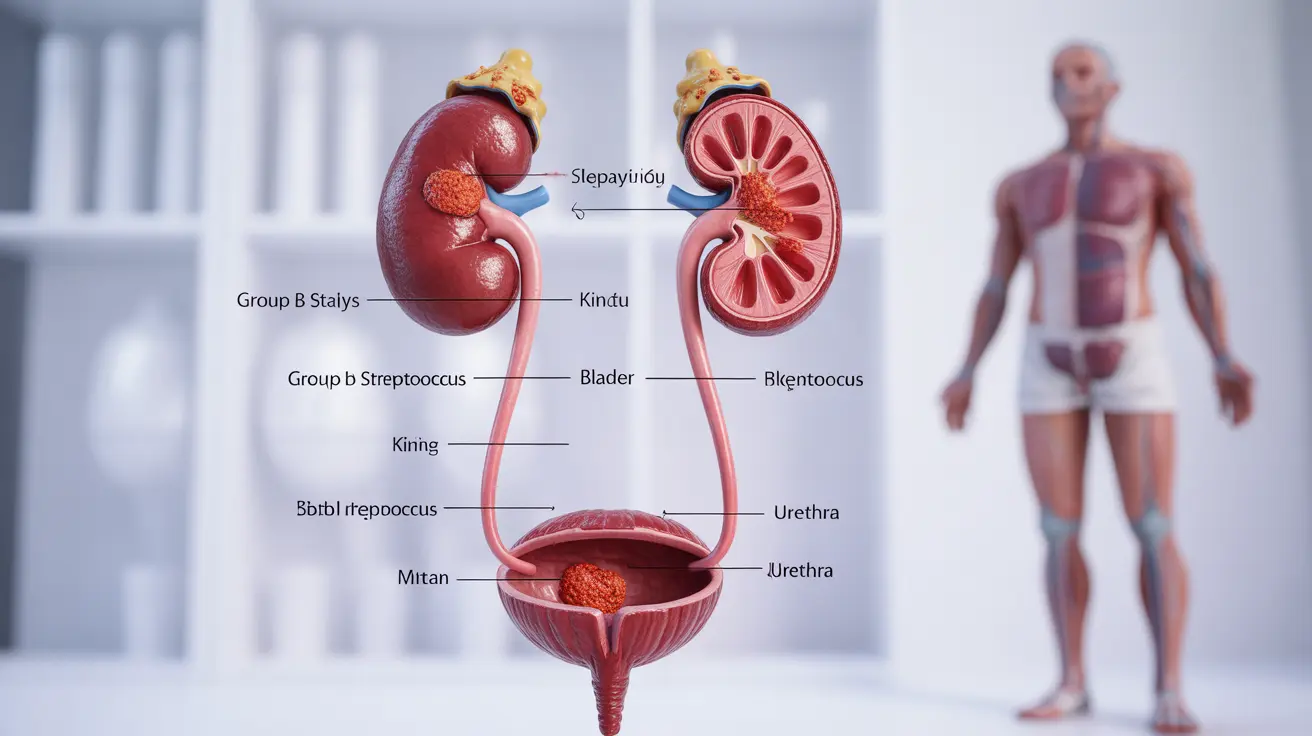Group B Streptococcus (GBS) urinary tract infections represent a specific type of UTI that requires particular attention, especially during pregnancy. While less common than other forms of UTIs, understanding their symptoms, risks, and treatment options is crucial for proper management and prevention of complications.
This comprehensive guide will explore everything you need to know about strep UTIs, from identification to treatment, with special consideration for high-risk groups and pregnancy-related concerns.
Identifying Strep UTI Symptoms
Group B strep UTIs can present with symptoms that may seem similar to other urinary tract infections, but their proper identification is crucial for appropriate treatment. Common symptoms include:
- Frequent urination with burning sensation
- Cloudy or blood-tinged urine
- Lower abdominal pain or pressure
- Low-grade fever
- Back pain near the kidneys
- Strong-smelling urine
Unlike typical UTIs, strep UTIs may sometimes present with milder symptoms, making them harder to detect without proper testing.
Diagnosis and Testing Procedures
Healthcare providers use specific methods to diagnose Group B strep UTIs accurately:
- Urine culture testing
- Clean-catch urine sample collection
- Bacterial culture identification
- Antibiotic sensitivity testing
These diagnostic procedures help determine not only the presence of Group B strep but also which antibiotics will be most effective for treatment.
Risk Factors and Vulnerable Populations
Certain individuals face higher risks of developing strep UTIs:
- Pregnant women
- People with diabetes
- Individuals with compromised immune systems
- Those with chronic urinary tract conditions
- Elderly individuals
Treatment Approaches
Treatment for Group B strep UTIs typically involves:
- Targeted antibiotic therapy
- Complete course of prescribed medication
- Increased fluid intake
- Follow-up testing to ensure infection clearance
Healthcare providers carefully select antibiotics that are both effective against GBS and safe for the patient's specific situation, particularly during pregnancy.
Pregnancy Considerations and Prevention
Pregnant women require special attention when diagnosed with a strep UTI due to potential risks to both mother and baby. Prevention strategies include:
- Regular prenatal screening
- Proper hygiene practices
- Immediate reporting of symptoms
- Preventive antibiotics during labor if necessary
Potential Complications
Untreated strep UTIs can lead to serious complications:
- Kidney infections
- Sepsis
- Pregnancy complications
- Preterm labor
- Newborn infections
Frequently Asked Questions
What are the common symptoms of a urinary tract infection caused by Group B Streptococcus (strep UTI)?
Common symptoms include frequent urination with burning sensation, cloudy urine, lower abdominal pain, fever, and back pain. Some patients may experience milder symptoms compared to typical UTIs.
How is a Group B strep urinary tract infection diagnosed and treated?
Diagnosis involves urine culture testing and bacterial identification. Treatment typically consists of targeted antibiotic therapy, chosen based on sensitivity testing and the patient's specific situation.
Who is at higher risk for developing a strep urinary tract infection?
Higher risk groups include pregnant women, people with diabetes, those with compromised immune systems, individuals with chronic urinary conditions, and elderly persons.
Can a Group B strep UTI during pregnancy affect my baby, and how can it be prevented?
Yes, untreated strep UTIs during pregnancy can affect the baby, potentially leading to preterm labor or newborn infections. Prevention includes regular screening, proper hygiene, and appropriate antibiotic treatment when necessary.
What complications can arise from untreated Group B strep urinary tract infections?
Untreated strep UTIs can lead to serious complications including kidney infections, sepsis, and in pregnant women, pregnancy complications such as preterm labor and potential transmission to the newborn.




